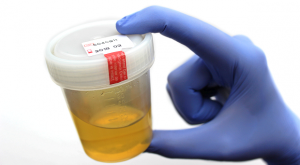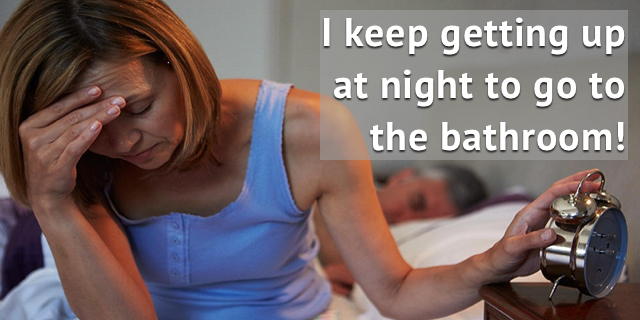By Professor Steven Kaplan, MD
“I never get a full night’s sleep…I’ve got to get up two or three times a night.”
“As soon as I lie down, I feel like I need to GO!”
“When it was just once a night, I could handle it. Now it’s once every hour!”
If any of these statements describe your experience, you might have a condition called nocturia caused by nocturnal polyuria (NP). Getting up two or more times at night is the defining symptom of nocturia.
Your Kidneys and Bladder
To refresh your memory, there are two previous posts that provide information about what your kidneys and bladder do. In 6 Facts You Probably Didn’t Know About Your Kidneys, describes how the kidneys filter the blood.
Filtration is a two-step process. First, blood moves through the glomerulus. Most of the time, blood flows from arteries that have thick elastic muscles to veins that have thin muscles. This difference is necessary because blood in the arteries is under higher pressure than veins.
The glomerulus is unique in that blood flows into the structure in arterioles (smaller arteries) and also flows out through arterioles. Filtering occurs because of the high pressure that is created.
Excess fluids, urea, uric acid and creatinine are some of the waste products that the kidneys filter.
That excess fluid and waste goes into the bladder in the form of urine. In “5 Things You Probably Didn’t Know About An Unappreciated Organ: The Bladder,” there is a description of what part your bladder plays in the urinary tract.
Nocturia Causes
Getting up at night to urinate frequently has lots of causes. In the past, because nocturia is urinating frequently at night, it’s been attributed an enlarged prostate (BPH) in men and an overactive bladder in women.
However, the most common cause is not your prostate and not your bladder. It’s simply making too much urine at night! The over production of urine at night is termed nocturnal polyuria or NP. There are lots of factors contributing to NP including kidney, cardiovascular, and pulmonary causes. It’s not a disease but more a symptom of something that’s going on in the body.
Nocturia is the most bothersome urinating symptom in both men and women. It can lead to decreased sleep, decreased efficiency at work and worsening quality of life. Nocturia has also been associated with an increased risk for falls, fractures, depression and even mortality.
Other causes of nocturia can be as simple as drinking too much fluids before bedtime or drinking the wrong type of liquids too close to bedtime. Alcohol and caffeinated drinks are diuretics (they make you go to the bathroom) and should be avoided before bed. Medications like diuretics (also called water pills), lithium and Vitamin D (if you take too much) can also cause nocturia.
However, the overwhelmingly most common reason why men and women get up at night is the overproduction of urine. One clinical trial conducted in 2011 found that around 80% of people with nocturia have nocturnal polyuria. In fact, as much as 20 – 33% of urine production can occur at night.
Finally, there are also underlying illnesses that have nocturia as a symptom. Diabetes, heart disease, high blood pressure, edema (swelling) of the legs and sleep apnea may be factors.
Testing to determine what is going on
 Unfortunately, lots of folks ignore nocturia and nocturnal polyuria because they think it’s just a sign of getting older. In addition, they believe that there is no medication or treatment that can make it better.
Unfortunately, lots of folks ignore nocturia and nocturnal polyuria because they think it’s just a sign of getting older. In addition, they believe that there is no medication or treatment that can make it better.
So what can your physician or health care professional do to help you get up less at night? First, a thorough history of what you’re eating and drinking as well as medications can be reviewed. Your daily fluid intake can be measured through a voiding diary (how much you drink and how many times and how much do you go to the bathroom) over a 24-hour period is done. Usually a urinalysis, which tests your urine for germs and blood, is done.
Treatment
Treatment depends on what your provider learns. There may be a simple solution that includes limiting your fluid intake around bedtime or reducing swelling in the legs with compression socks. Or you might benefit from medication that can reduce the amount of urine you produce at night. (A randomized double-blind study using Desmopressin, found a reduction in the symptoms of nocturnal polyuria.)
Remember, going to the bathroom two or more times per night is not normal. Get it checked out!






I am finding this happens to me and also have a damaged kidney which may not be helping. Told all the time my urine tests are clear and nothing is done to help. Have kidney stones for a few years also. Thankyou as now I may be able to ask my doctor about this condition. Debbyanne Southwell
I too suffer with multi-trips to the bathroom all day & night. Drs. Diagnosed me with two masses. One on bladder and one wrapped around prostate. For anyone suffering needlesdly, see your doctor. It’s never too late or too early to take care of yourself. Trust me.
everytime i’m drinking a small brandy it seems to settle my bladder how can this be when i stop i’m running to the loo all night again , although this does not help my restless legs :-/ guess we can’t win
I get up four times a night, was diagnosed with sleep apnea, and refuse to use CPAP — it is a disgrace that there’s no pharmaceutical treatment yet for this problem! I’m trying to get operated on — let’s go researchers!
You’re a fool for not wearing a clap. Surgery doesn’t always help and neither does medicine. I’ve had two surgeries and still the only relief i get is from the CPAP machine. Some states can even revoke your driving license for not properly attending to your sleep apnea diagnosis.